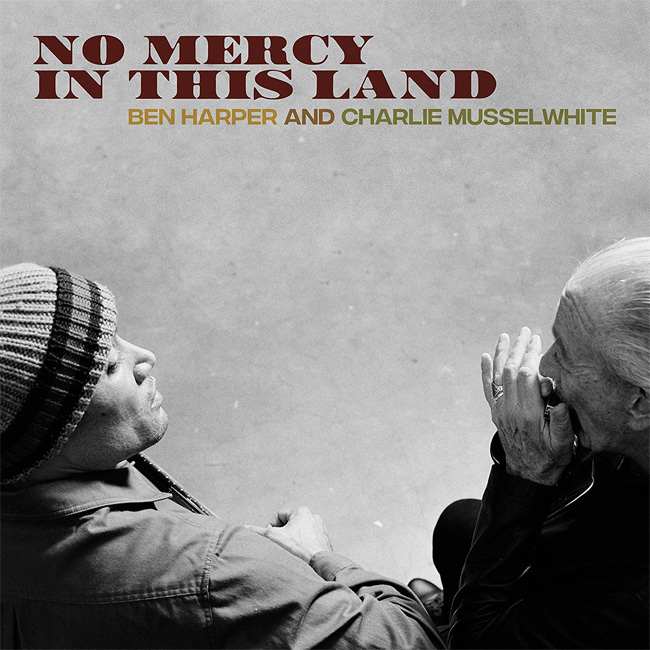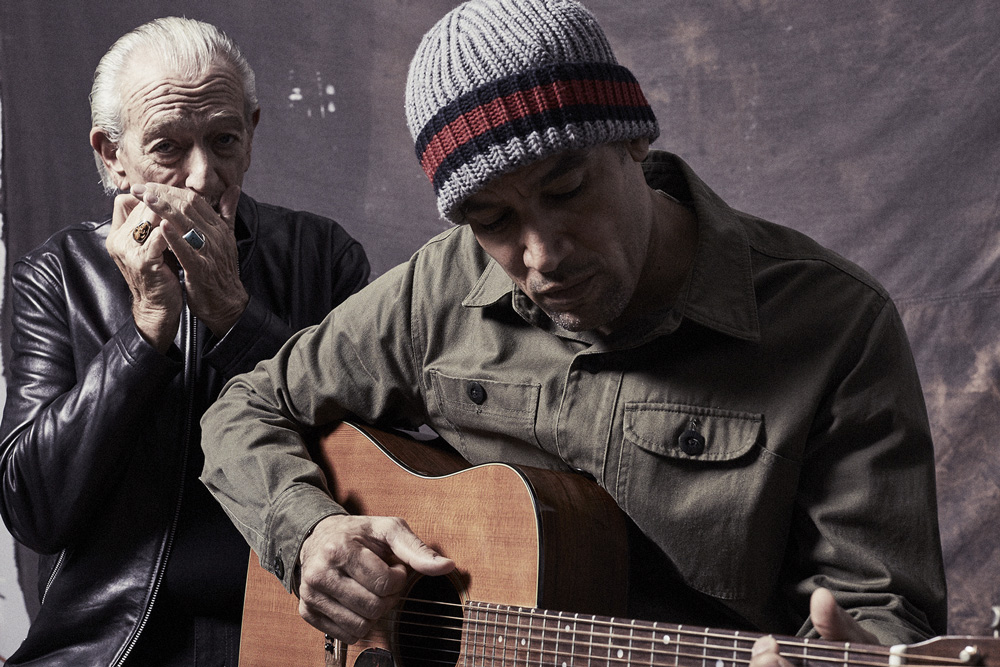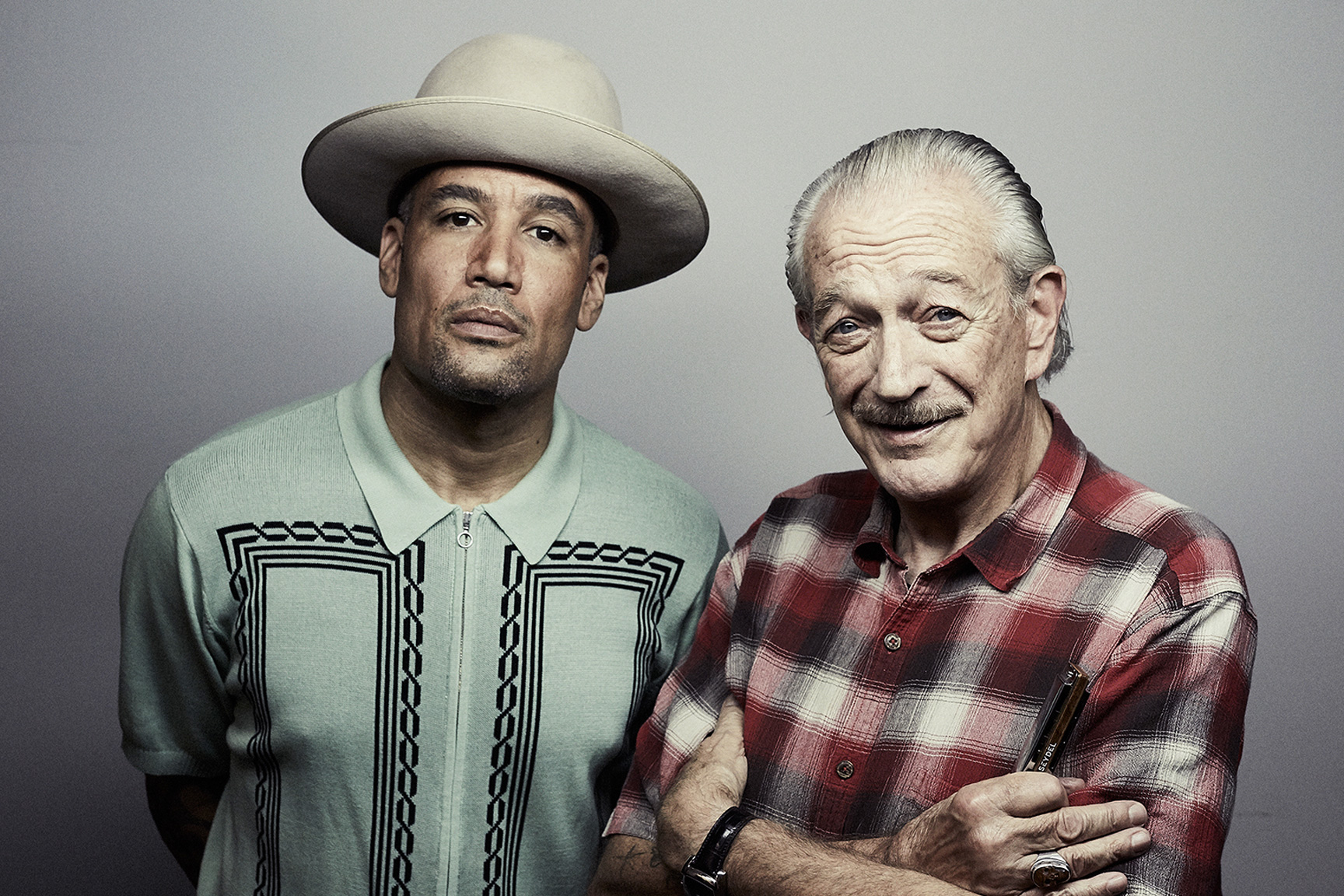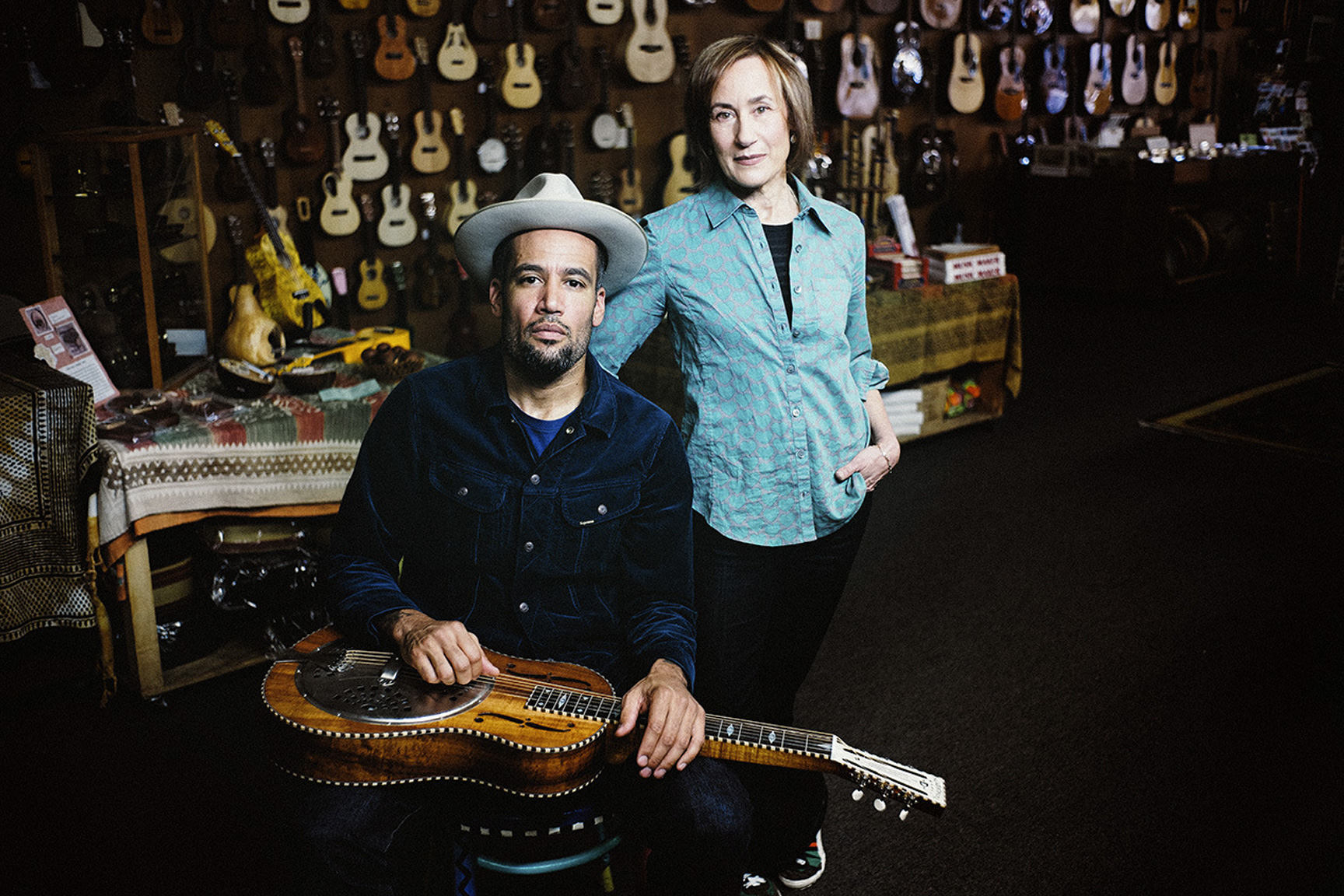Born into a family of folk musicians and blessed with a mother who shared her records and Martin 00-18 with her young son, Ben Harper was well positioned to bring the roots of American music to his genre-spanning career.
Whether in his acoustic solo work, his rock jams with The Innocent Criminals or the Relentless7, or the Grammy-winning 2004 gospel album he made with The Blind Boys of Alabama—Harper has always played with a firm grasp on tradition. But in the interview with Reverb below, Harper says it wasn’t until making a trio of recent albums that he found "the center of my musical circle."

One was 2013’s Get Up! with blues harmonica great Charlie Musselwhite, which won Harper another Grammy. Another was 2014’s Childhood Home—a duet album with his mother, Ellen Harper, and an emotional testament to everything she instilled in him through her own playing, her record collection, and her family’s Folk Music Center & Museum, a 60-year-old institution in Claremont, California.
The third—and his latest with Musselwhite—is No Mercy In This Land, which comes out this Friday, March 30. It’s part raucous Chicago blues, part Delta fingerpicking, and includes a standout Percy Mayfield-inspired soul track for good measure.
Ahead of its release, Harper spoke with Reverb to talk about the songwriting and recording process, how making the album with his mother got him closer to Charlie, and how songs can come out of nowhere if you get your ego out of the way.
In the mini documentary that you put out for No Mercy In This Land, you said the blues you write are born to be played with Charlie. When in the songwriting process did you know that Charlie was going to be recording with you again?
You know, after writing songs for so long and so many years, you recognize their respective homes as they come alive or as they come to life and complete themselves. There was five years or so between Charlie and I’s last record and this record, and songs would pop out and I’d just say, Yep. I’d just dog-ear them. Just mark them, "Charlie." Done. Moving on.
Best part about it is we didn’t plan it. We made the first one, put in a couple hundred shows and a couple million miles, and just knew that—I mean, we didn’t know—but we knew there was a place for us to continue moving forward with our sound, our collaboration. We didn’t rush it. We didn’t push it. We just let the time open up again. I’m glad it wasn’t another 15 years, because we had talked about making a record together before the first one for 15 years. So, I’m glad this one only took five.
What about the actual recording? What studio were you in and what was the general setup?
We were in the Village Recorders in West LA/Santa Monica, right at the border there—deservedly a famous studio for their room selection and their mic selection. They’ve just got all the goods. And we decided to go into the Village for that reason.
The setup was all of us in a room, not so small that we were uncomfortable, but so small that you basically had to step over instruments on the way to yours. Big enough to get a drum sound out of the room, but not so big that the drums would swallow everyone else in the room.
As far as the microphone selection there, I imagine we’re talking vintage mics?
Vintage ribbon mics, as well as, you know, 47s, 87s, C 12s, RCA ribbon mics—that kind of thing.
In listening to the album, it sounds like there’s a good mix of that vintage mic/vintage equipment appeal and what sounded, to me at least, like a couple newer recording techniques. Did you go into it with an idea of mixing blues with some modern production methods?
Absolutely. The production on this record is no accident, and with the engineer Ethan Allen and myself having a very clear vision on how we wanted to bring these sounds to life. There’s a close-mic addiction in modern music that needs to be broken that we’re proud to say we’re part of the movement of. But you don’t want to leave it behind either.
So, there’s the close-mic process, there’s the room-mic process, and then there’s blending the two, which is a third sound all its own, which I think gives this record a huge part of its character—being able to blend those two. We’re not reinventing the wheel here, but just as our process to give it a fresh feel, so it’s not retro, but it’s not overly close-mic’d and in your face.
As far as the inspirations here, there’s moments on the album that are country/folk blues and others that are Howlin’ Wolf-like Chicago stompers. How do you go about pulling all these different strains together?
Hopefully, that’s what contributes to this being a unique statement in the world of blues, and that’s also hopefully what makes it an unpredictable blues record. Because it’s hard to make a blues record this far removed from the inception of the blues and have it be a contribution to the genre and thereby be unique.

Also, we wanted to improve on our last record. We wanted to take it further and I just—A, I don’t write like that. And B, because Charlie and I have such an eclectic appreciation of the blues new and old, I wanted to reflect our appreciation and our love of different styles of blues on this record.
Not that we had a choice, because that’s how I write anyway. You know? So, in the music I’ve made all my life, it’s probably one of the more unique components to what I do, is that it is eclectic. So, it was bound to be an eclectic blues record, but I think more to the point is that Charlie and I have eclectic taste within the genre of the blues, and hopefully it reflects in a unique way through this record.
Were there any moments when Charlie kind of pulled the elder statesman card? Like, "No boys. This is not how we play it."
[Laughs.] We had approached Charlie with such reverence that our main goal as producers, because I produce with the band as well, our main goal is to not allow that to happen going in. So, we gave him very few reasons to have to pull that card. Now, did he pull the card?
I think when we were getting the songs together, there was another half-dozen songs or so that didn’t make the record, and in that process, the elder statesman card is kind of just—Charlie does it with such care, because he recognizes he is the center of the circle. So, he does it in such a caring way, you almost don’t realize that’s what he’s done until after he’s done it.
Did you go into the recording process knowing ahead of time what style a particular song would take, or was it a natural progression of you guys jamming on them in the studio?
The songs have a way when they’re done, just in the stripped-down vocal/guitar form, of crying out to be played in a specific sound and style. So, that’s a great place to start—when the song is strong enough to be produced a dozen different ways and still be solid, yet there’s one way it should go and everyone in the room is hell bent on getting to that one way. So, that’s why my productions are from the best idea in the room. You know when somebody’s on it and you let them run with it.
One track that stood out to me, just because I thought it had more of a Memphis soul vibe, is "When Love Is Not Enough." Can you just tell me kind of how that song came about and what it means to you?
Tell me more about what you heard in that song.
I heard Stax Records, Otis Redding, there’s that beautiful piano part going. And if I’m not wrong, I didn’t hear Charlie. Was he not on that track?
That was the first track we recorded for this record, and we recorded it separately from the other sessions. That track walked up and entered into the room. Speaking in metaphysical terms that lean towards the auspicious, you run the risk of sounding like an absolute lunatic or someone who is so full of themselves, they actually think that they have a direct line to something someone else does—and you run a terrible risk in that in waxing poetic in these terms. But at a certain point, you do have to own when something happens to you that’s unexplainable, inexplicable, both. You know what I mean?

I’m not big into coincidence, but that song walked into the room, tapped us on the shoulder—we all got on our instruments. I sang that song—I’d never sung like that before or since, and God knows if I can do it every night. I don’t know if I want to have the emotional weight of singing that song every night. You might have to wrap me up in a padded cell. Too raw. A man should only get so honest in public, period. I don’t know if that crosses the line or not, to be seen.
I sang that song sitting on the couch. After that song, I thought, man I need to sing sitting down. I need to sit and do my vocal takes more often. But I’m glad you brought that song up because—it’s great the fact that the blues is a very wide circle, and it’s also great to push outwards from as wide as it is.
Reference point: Percy Mayfield. I’m a huge Percy Mayfield fan. "Please Send Me Someone to Love," "Hit the Road Jack"—those are blues songs. Just because Ray Charles—Ray Charles was a blues singer, now, make no mistake. It just got popular, therefore was pop. Nirvana was punk rock, but got popular, therefore was pop. You know? Pop music is the only style of music that is a genre and a business accomplishment, because there is a pop music that is a sound, but pop music also is defined by sociocultural awareness.
Just to go back for a second, when you said this song just happened—can you tell me more about that?
I had made a record with my mom called Childhood Home. The day we finished that record, we got a call having been nominated for a Grammy for the Charlie record [Get Up!]. We got that call and we had just finished the last track for Childhood Home, a song called "How Could We Not Believe?"
Call came in. We got it. We were all high-fiving, and then we all just kind of were sitting around, stumbled over to our instruments, and that came out. It truly entered the room. My wife even came downstairs and went—from the studio, there’s a loft—she came downstairs and went, "What’s going on? You guys were just high-fiving about getting nominated for a Grammy and now, and you just finished your mom’s record. You’re double high-fiving—finishing a record and getting nominated and now you’re recording again." Like, Where did this song come from?
It really just entered into the room and poured out. You can ask. Call somebody else and—
[Ed.: At this point in the call, Jaclyn Matfus, Harper’s wife, holds a side conversation and recounts the story, saying, "The room changed."]
And we’re not people who talk in those terms. I don’t. I sat down and just pulled the mic up and it just poured out of the damn pen on to the blank page and got it down in that one take. I’ve got a witness here. That’s why I married her.
That record with your mom, Childhood Home, had so many different folk strains and even a kind of classic country duet feel to some of the songs. And I know that your mom and her parents have the Folk Music Center & Museum. How much of your respect for these traditional art forms is your mom responsible for?
All of it. All of it. My mom and my grandparents—that music store is now in to five generations of my family running it—and my mom, she is the first voice I heard growing up. I mean, she was playing and singing around the house. When my mom and dad got divorced, my mom wasn’t mad about the divorce—my mom was mad that my dad took all her records.

When we left the house—like, we all left in quite a hurry, quite a scuffle—but when we came back, pops had taken my mom’s, at that point, I don’t know, a thousand records. They were all gone. It was the first thing I noticed in the house. We walked back in. I was like, five years old. I was like, Oh shit, because I put the needle on the record when I was three. You can ask my mom. Like, I knew how to put down the needle when I was three years old, without a skip.
So, I walked in the house—when I was five, my mom got me my own Realistic RadioShack record player, because I was fucking up all her records. She was like, "No, we can’t have this shit. You can pick your six favorites. Here’s a record player. You need to go in your room. You’ve got to stop, because you’re scuffing my records."
When we came back in the house once all of the dust had settled and those records were gone, I was like, Oh shit, this is —you could feel the temperature change in the room. You know when somebody’s in trouble, and you’re just glad it’s not you? Yeah, man. My mom, she raised hell trying to get those records back.
So, she was your music teacher though?
Yeah. She didn’t ever make me—she refused to take a prodigal approach. She was impressed. She got me, at a young age, she got me a very cheap, inexpensive nylon guitar, but I refused to play it—I wanted her 00-18 Martin.
She was like, she saw that I had a pull toward these instruments and kind of the finer things— like, I would play her Dolly Parton records over and over. She saw something going on, you know? She would let me bang away on her Martin a little bit and then I’d scuff it and she’d, "Aah, Benjamin." But she was the first person that kind of opened up the door and said all right, run with this. You know? And she didn’t start you with lessons—she started me with records as my lessons, and that kind of set the course for me. I really owe it all to moms.
How was recording with her? I can only imagine the kind of weight, the mental weight, of sitting down and actually making that record.
It was weighty. It was heavy. What was also heavy was the song selection process threw me for a loop, because I suddenly was pulling from material—I knew my mom and I eventually would get to it. So, I’d go, Childhood Home? I don’t know. You know, this might be a duet—I’ll set it aside. "Learn It All Again Tomorrow?" I don’t know. I’ll set aside. You know?
So, I’d been kind of silently preparing this subconsciously, but when it came time, there was—I had enough material to pull from, my mom had a lifetime of songs, and we’d start throwing material out onto the table. And there’s a lot of songs you can’t record with your mom, because you just can’t, you know? "To know you is to love you…"
Turns out most songs are about either finding love, losing love, or being in the middle of love—none of which you can sing with your mama. So that wiped out 90 percent of the canon. But that was the beauty. That brought about the challenge of really fine-tuning what we had and what we could bring to the table and that really is what defined the record.
But that doesn’t answer your question. How was it? It was one of the five greatest musical experiences in recording of my life. Mom’s in a class by herself, ‘cause she’s my mom. But you know what? At the end of the day, we had to become peers and comrades, as well as mother/son. I would put recording with her right up there with recording with John Lee and with Charlie Musselwhite and with Ringo Starr and with Solomon Burke, and Rickie Lee Jones, Natalie Maines—mom is in the pantheon of the great experiences I’ll always carry with me.
And I don’t mean to be a name dropping prick either, because people that do that drive me nuts, but sometimes you make the news, sometimes you record the news, and sometimes you do both.
Did that process help you get deeper with Charlie? Was it a similar experience?
You’re spot on. Between that first Charlie record, the record with my mom, and the new Charlie record, it has definitely brought me home. It’s brought me back to the center of my musical circle, that, without those three records, I don’t think I would have gotten back to anytime soon. So, I’m greatly indebted to my mom and Charlie for bringing me back to the music that I started with. It’s truly a full circle arrival for me, musically.

